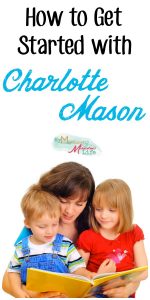Inside you’ll find: What the Charlotte Mason homeschool philosophy is and how to dive in without losing your mind!
When I first heard about Charlotte Mason in homeschooling circles, I totally misjudge it. First I thought is was akin to unschooling, then I thought it was impossibly rigorous and unobtainable. But thankfully I kept digging into her ideas and found them to be the PERFECT fit for our family!
This post contains affiliate links for your convenience. Please read my full disclosure policy here.
Spreading the Feast
Mason described education as partaking of a feast. As teachers, we are to expose kids to a “feast” of living ideas through literature. Kids get first hand knowledge of subjects from people that are passionate about the topic. They hear information via stories and plot and passion. They internalize it. It becomes theirs.
Contrast this to dry textbooks. Information is delivered second hand and leaves the child feeling like they have to like or remember the exact same things that the textbook writers want them to. Mason kept up the analogy and described textbooks like a chef insisting on chewing a child’s food for them and spitting it back out, before they would then eat it themselves.
Gross, but you get the point!
Because of Charlotte Mason, my boys have been exposed to things I thought they’d get NOTHING out of or would be way over their heads. Example, I read poetry and Shakespeare to my 6, 4, and 2 year old BOYS.
Living Books for Every Subject
Assessments and Testing i.e. Narration
Morning Time
Books, Podcasts, and Groups for YOU
Books
Podcast
Facebook Groups
This is my favorite CM Facebook group. It’s run by the folks that put on “The Mason Jar” and you can glean all sorts of great things. People are very supportive and non-judgey.
This one is totally focused on CM and can be a little bit intimidating, but if you have any tricky Charlotte Mason related questions, this group sure knows its stuff!








[…] we got into the Charlotte Mason method of homeschooling, I was shocked that even 1st graders were being introduced to the iconic plays of the […]